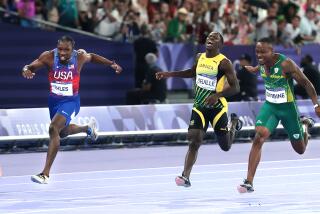Italians Admit Fixing World Meet Long Jump : Myricks Earned Bronze, Was Placed 4th
- Share via
An Italian Olympic Committee investigation has confirmed suspicions that the long jump results at last summer’s track and field world championships in Rome were fixed to ensure that Italian Giovanni Evangelisti would get third place, thus denying Larry Myricks of the United States a bronze medal.
Italian Olympic Committee (CONI) officials reported the results of their three-month investigation Friday in Rome, implicating eight members of the Italian track and field federation (FIDAL) in the scandal. One of those implicated, Luciano Barra, is FIDAL’s general secretary and an assistant to Primo Nebiolo, president of both FIDAL and the International Amateur Athletic Federation (IAAF), the sport’s governing body.
According to CONI’s report, the announced measurement of 27 feet 6 inches for Evangelisti’s final jump, 2 inches beyond Myricks’ best jump, “was not the one actually reached by the Italian athlete.”
Nebiolo requested a meeting of FIDAL’s federal council in April to determine penalties against the eight officials but did not say whether the IAAF will award a medal to Myricks. Carl Lewis of the United States won the gold medal and Robert Emmiyan of the Soviet Union the silver. Myricks was placed fourth. Upset by media skepticism about his performance, Evangelisti, 26, said earlier this year that he gave his medal to a young Italian athlete.
“I’ve got nothing against Evangelisti,” said Myricks, 32, from his home in Orange County. “He was a victim just like I was.
“I knew there was something going on, not just on Evangelisti’s jump but on a lot of them. I was seeing things happen during the whole competition. I’m just glad to see them admit that something was done wrong. That’s not enough consolation, but it’s some consolation.
“If I get the medal now, it’s well and fine. But getting it there in the crowded stadium, with all the people back home watching on television, is a moment I’m never going to get. Evangelisti got the moment. That’s an opportunity for me that’s gone.”
Many observers at the world championships speculated that Evangelisti’s final jump was inaccurately measured, spurring investigations last fall by several European publications and Italian state television, RAI. Using a computerized measuring device, RAI concluded last November that Evangelisti’s final jump actually was 25-11 and that he should have finished in fifth place with a best of 26-10 1/2.
According to London’s Sunday Times, a study conducted by the Sports Institute in Cologne, West Germany, revealed that Evangelisti’s final jump measured 25-11 1/2, and that the final jumps of Myricks and Cuba’s Jaime Jefferson were significantly farther than announced.
The IAAF, acting upon a request from FIDAL, investigated, concluding that all jumps were correctly measured.
“It is not possible to consider the hypothesis of different measurements, carried out at a later date, as integral to or substitute for the official measuring process,” the IAAF report said.
But CONI began its inquiry after Sandro Donati, sprint coach for the Italian national team, filed a police report, charging that FIDAL officials arranged before the competition for Evangelisti to win a medal.
Before the final round in the long jump, Donati said, FIDAL officials sent the two British supervisors for the measuring computer to supervise the pole vault competition and disconnected the computer. He said all jumps in the final round were measured only by tape.
One of the major gaffes of the competition occurred that afternoon, when the awards ceremony for the women’s shotput interrupted Soviet pole vaulter Sergei Bubka’s attempt at a world record. Donati charged that the mistake resulted from the meet’s technical director, Paolo Giannone, leaving his grandstand box and going onto the field to assure that Evangelisti was given an exaggerated measurement. Donati said the only officials around the long jump pit during the final round were Italians.
CONI’s findings vindicated Donati, who was dismissed by FIDAL as a national coach after he took his claims to the police.
More to Read
Go beyond the scoreboard
Get the latest on L.A.'s teams in the daily Sports Report newsletter.
You may occasionally receive promotional content from the Los Angeles Times.






